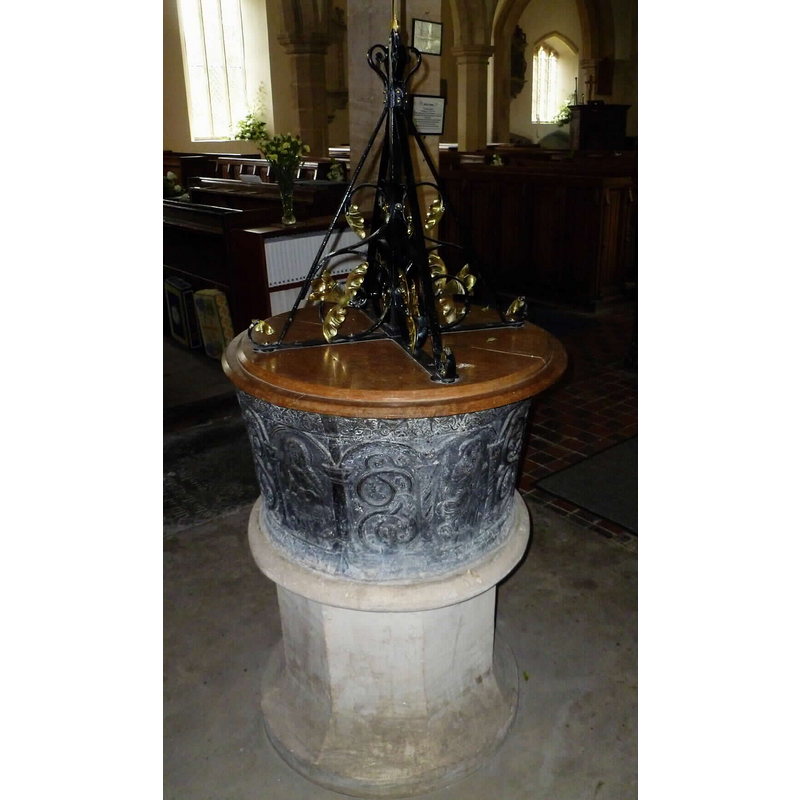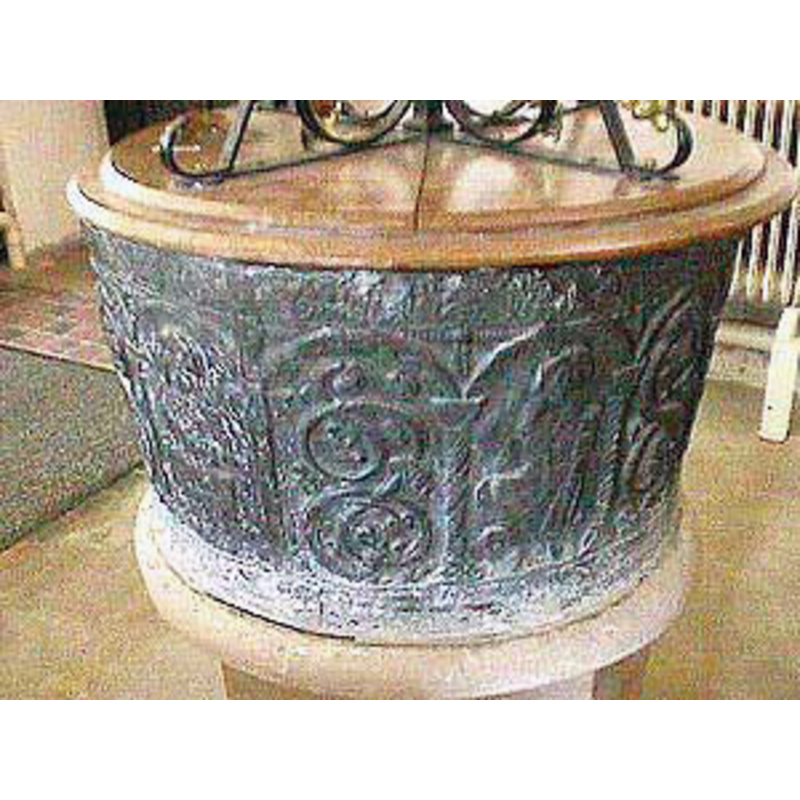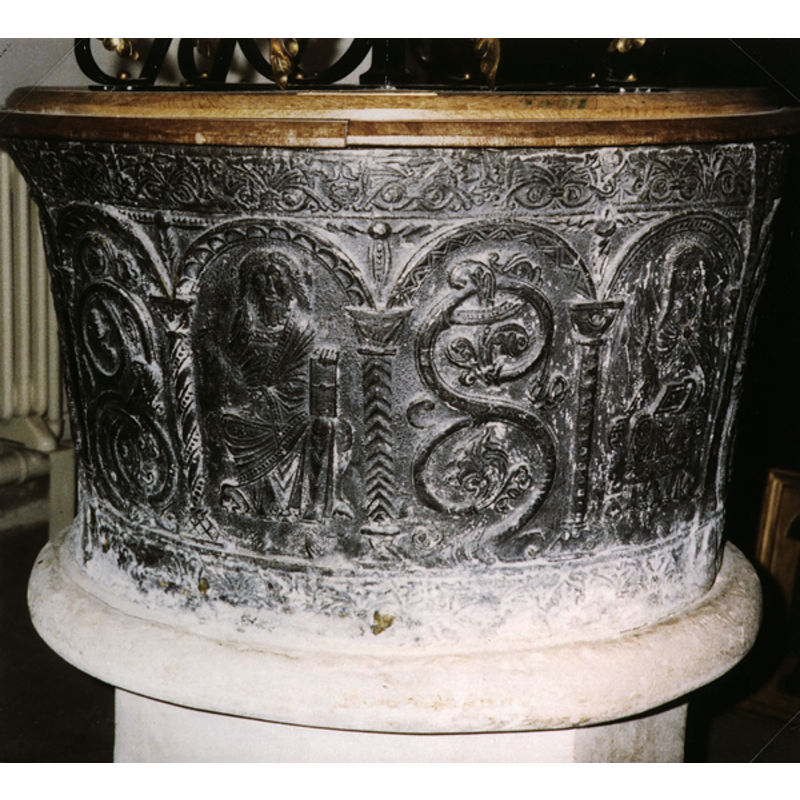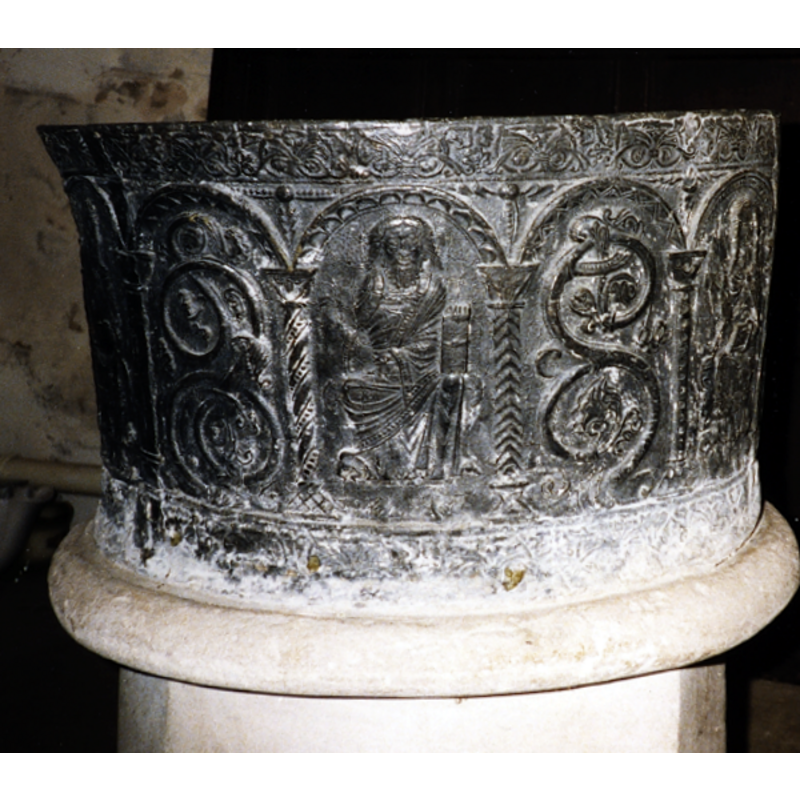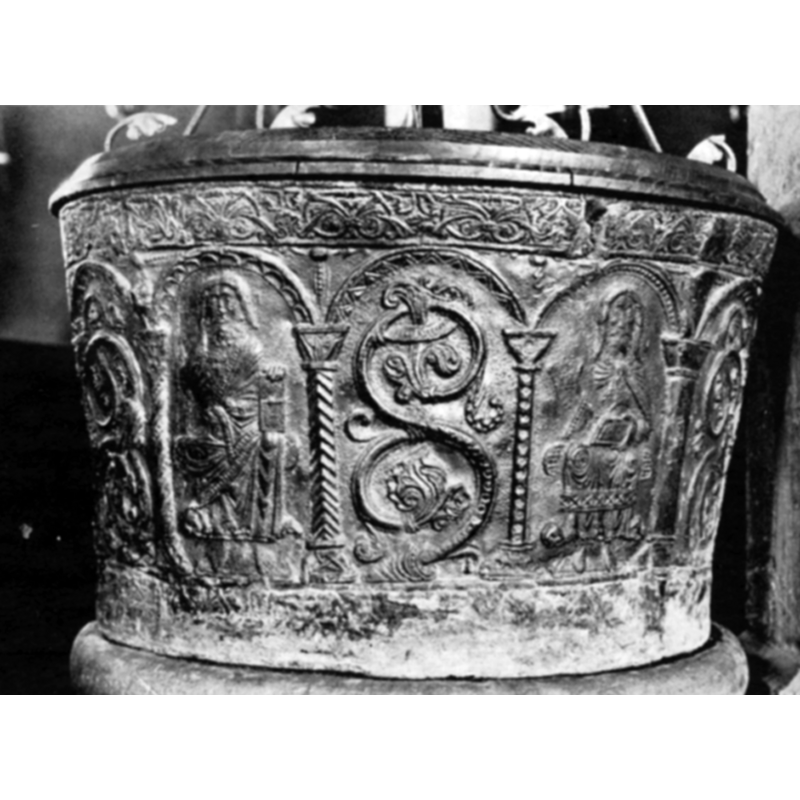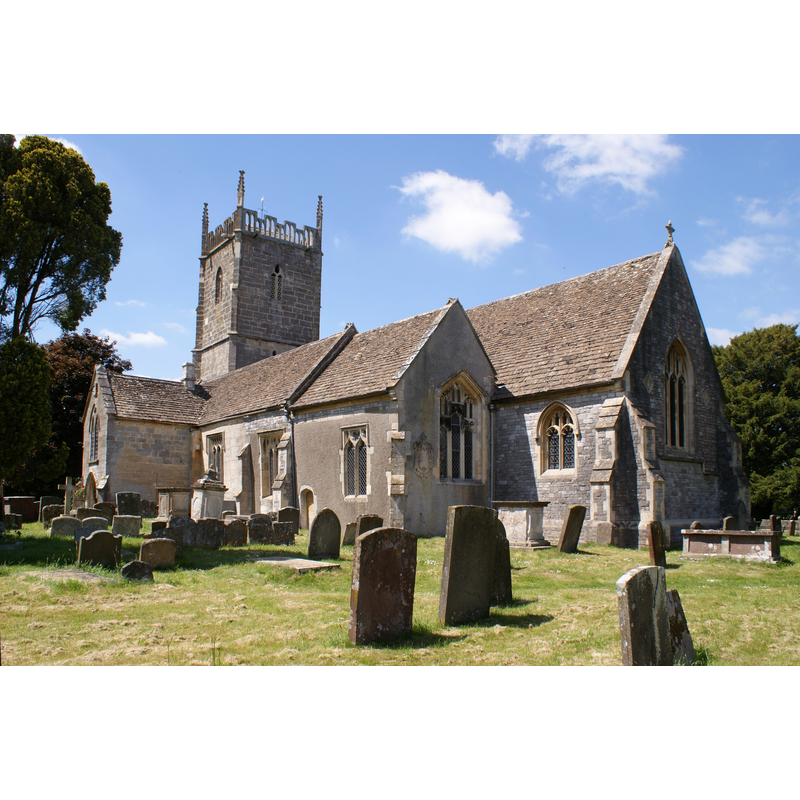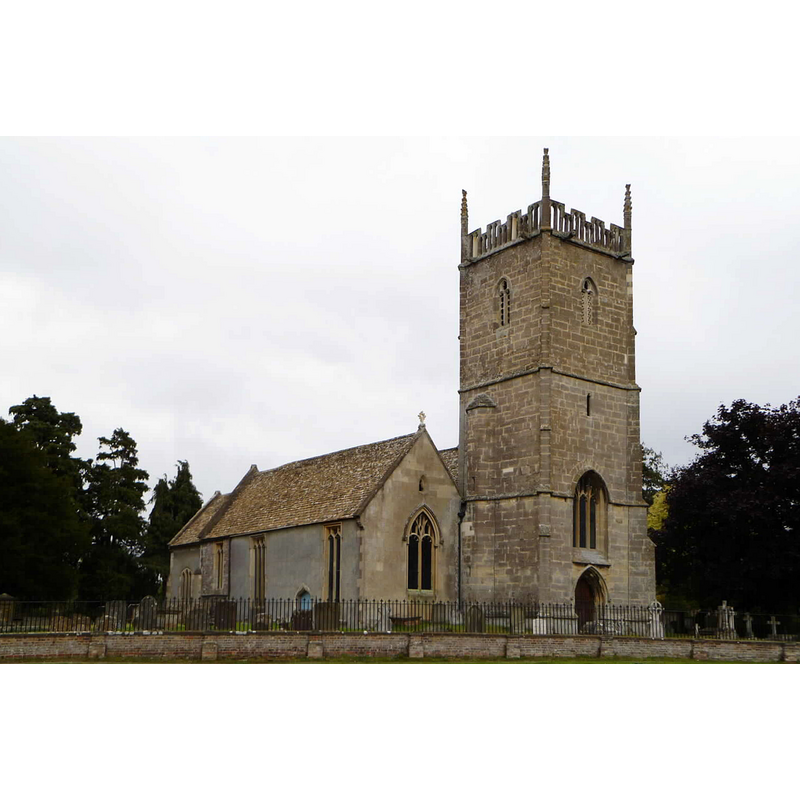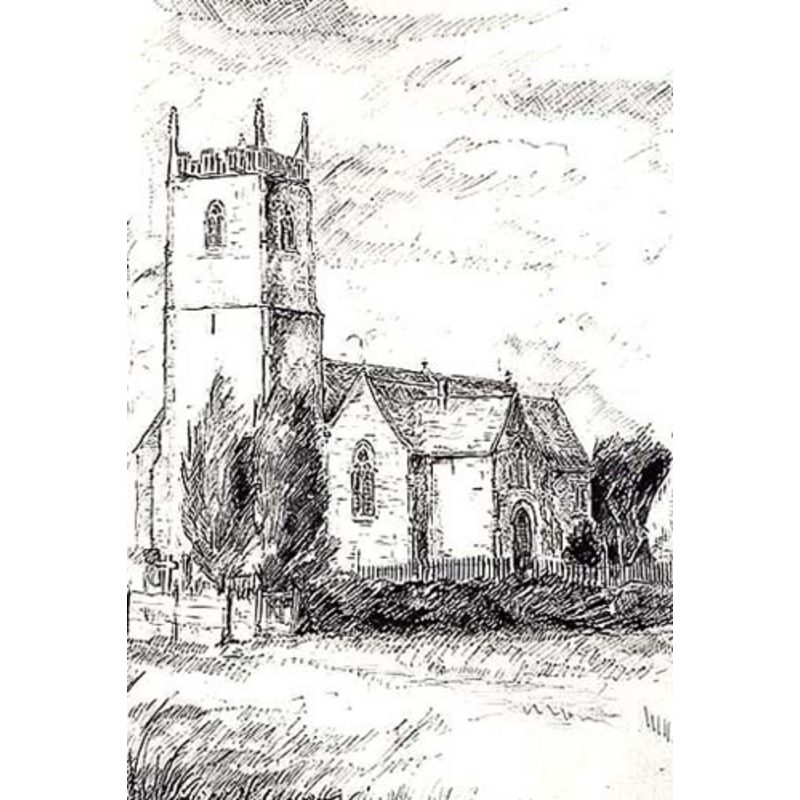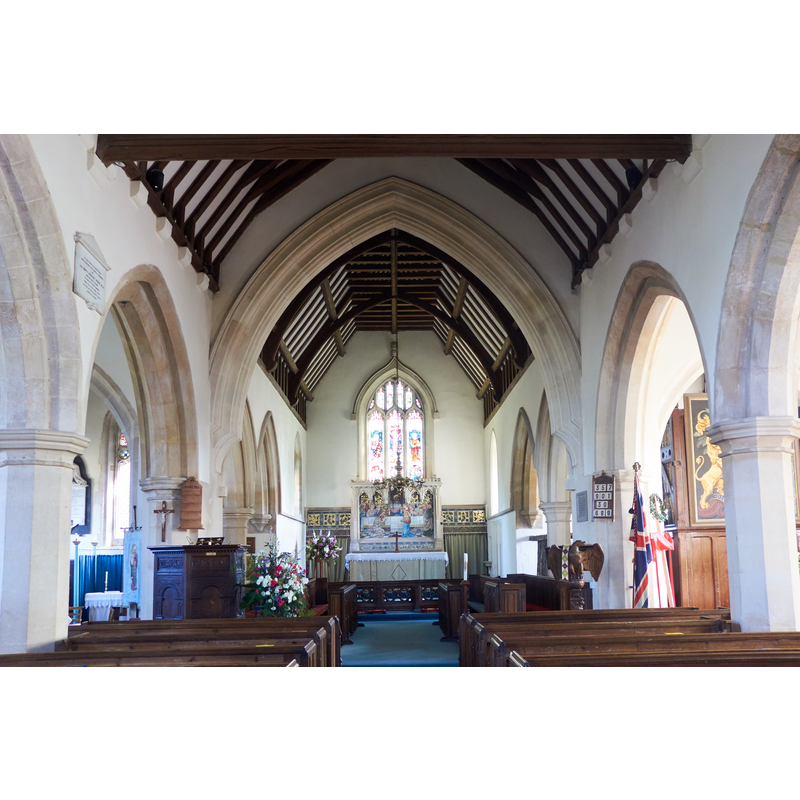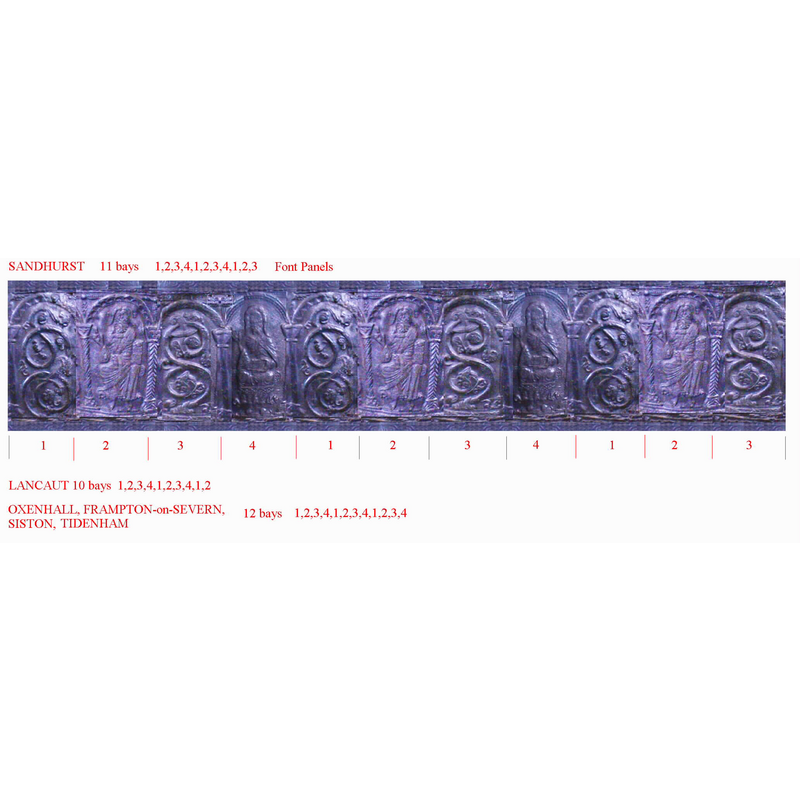Frampton-on-Severn / Frantone
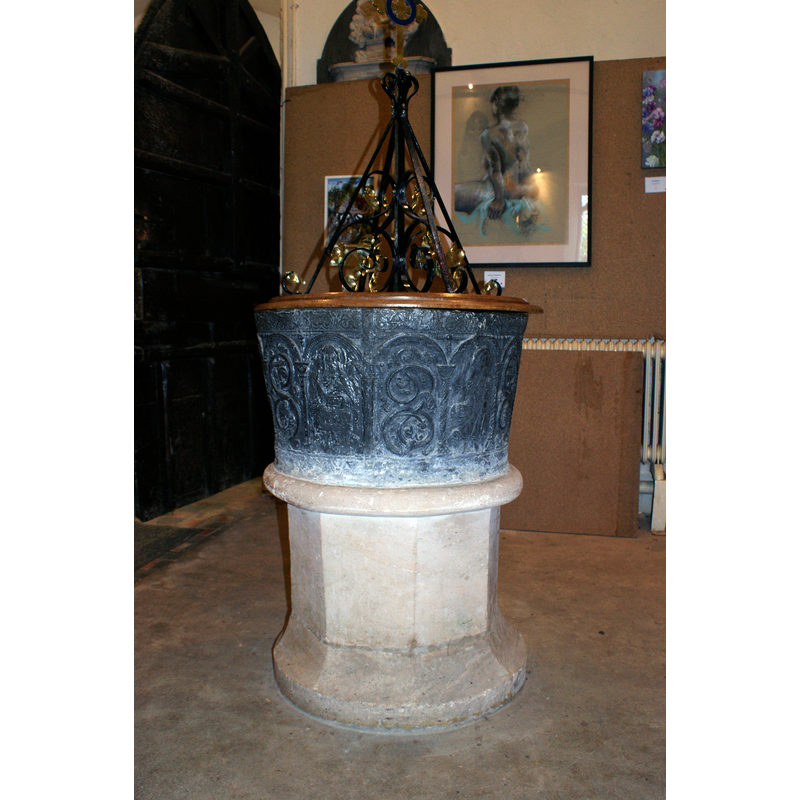
Image copyright © Hugh Llewelyn, 2013
CC-BY-SA-2.0
Results: 14 records
view of font and cover
Scene Description: Source caption: "12th Century Norman Font, one of only six lead fonts in the UK, in St. Mary the Virgin, Frampton-on-Severn, Decorated Style."
Copyright Statement: Image copyright © Hugh Llewelyn, 2013
Image Source: digital photograph taken 29 August 2013 by Hugh Llewelyn [www.flickr.com/photos/58433307@N08/9621754755] [accessed 12 February 2019]
Copyright Instructions: CC-BY-SA-2.0
view of font and cover
Copyright Statement: Image copyright © John Wilkes, 2011
Image Source: digital photograph taken 26 August 2011 by John Wilkes [www.allthecotswolds.com]
Copyright Instructions: Standing permission
view of font and cover
Copyright Statement: Image copyright © John Wilkes, 2006
Image Source: digital photograph by John Wilkes [www.allthecotswolds.com]
Copyright Instructions: Standing permission
human figure - male - seated - 6?
design element - motifs - foliage
design element - architectural - arcade - round arches - columns with capitals and bases
Scene Description: each of the twelve arches has a different pattern ornamentation: beaded-tape, zig-zag, semicircles, etc.
Copyright Statement: Image copyright © C. S. Drake, 2002
Image Source: digital image of a colour photograph by Colin S. Drake, 2002
Copyright Instructions: Image and permission received 2000
design element - motifs - scroll
view of basin
view of basin
view of church exterior - southeast view
Scene Description: Source caption: "St. Mary the Virgin, Frampton-on-Severn, mostly dating from 1315, Decorated Style."
Copyright Statement: Image copyright © Hugh Llewelyn, 2013
Image Source: digital photograph taken 29 August 2013 by Hugh Llewelyn [www.flickr.com/photos/58433307@N08/9625007076] [accessed 12 February 2019]
Copyright Instructions: CC-BY-SA-2.0
view of church exterior - northwest view
Copyright Statement: Image copyright © John Wilkes, 2011
Image Source: digital photograph taken 26 August 2011 by John Wilkes [www.allthecotswolds.com]
Copyright Instructions: Standing permission
view of church exterior
Copyright Statement: Image copyright © John Wilkes, 2006
Image Source: sketch by Robert Wilkes in John Wilkes [www.allthecotswolds.com]
Copyright Instructions: Standing permission
view of church interior - looking east
Copyright Statement: Image copyright © Celuici, 2017
Image Source: digital photograph taken 22 April 2017 by Celuici [https://commons.wikimedia.org/wiki/File:Interior,_church_of_St_Mary_the_Virgin,_Frampton_on_Severn_2.jpg] [accessed 12 February 2019]
Copyright Instructions: CC-BY-SA-3.0
INFORMATION
Font ID: 00260FRA
Object Type: Baptismal Font1
Font Date: ca. 1175-1200? [Zarnecki]
Font Century and Period/Style: 12th - 13th century, Norman
Workshop/Group/Artisan: lead font
Cognate Fonts: Siston, Oxenhall, Tidenham, Lancaut, and Sandhurst (Gloucs.), all believed to have been made from the same mould.
Church / Chapel Name: Parish Church of St. Mary
Font Location in Church: Inside the church
Church Patron Saint(s): St. Mary the Virgin
Church Notes: original church 12thC, consecrated 1315
Church Address: Frampton-on-Severn, Gloucester GL2 7EH
Site Location: Gloucestershire, South West, England, United Kingdom
Directions to Site: Located on the E banks of the Severn, near the Wildfowl & Wetlands Trust, 15 km SW of Gloucester
Ecclesiastic Region: Diocese of Gloucester
Historical Region: Hundred of Blachelaue [in Domesday] -- Hundred of Whitstone
Additional Comments: The British History Online lists a 1929 photograph of this font by B.C. Clayton on p. 206 of vol. X (1972) of The History of the County of Gloucester, Victoria County History
Font Notes:
Click to view
There is an entry for Frampton [-on-Severn] [variant spelling] in the Domesday survey [http://www.domesdaymap.co.uk/place/SO7407/frampton-on-severn/] [accessed 10 October 2014], but it mentions neither cleric nor church in it. The font here is noted in Andre (1882) as a "leaden font" of the Norman period. In Lethaby (1893). Cox & Harvey (1907) write: "The effective decoration on these fonts is in high relief; it comprises a band of foliage at the top and bottom, and between them an arcade with alternate figures and scroll-work." The arches, capitals and columns of the arcade are all ornamented with varied motifs. The two figures visible in another source [cf. infra] are of sitting bearded long-haired male figures, a book held by the left hand and leaning on the left knee, the right hand raised in benediction; also in an illustration in Bond (1908), who dates the font to the end of the 12th or beginning of the 13th century. In Fryer (1908). Illustrated in Crossley (1941). Described and ilustrated in Zarnecki (1957) who dates it to the third quarter of the 12th century. Noted and illustrated in Verey & Brooks (1999-2002) as one of six 12-century Norman lead fonts in Gloucestershire; 19th-century stone support. The Victoria County History (Gloucester, vol. 10, 1972) notes: "The reference to the Vicar of Frampton in 1228 [...] is the earliest known record of the church there; the only part of the fabric of the church that is clearly of an earlier date is the font, described below, which may either survive from a 12thcentury church at Frampton or have been brought from elsewhere. [...] The font has a lead bowl apparently of the third quarter of the 12th century, one of a group of six Gloucestershire fonts from the same blocks." This last reference in the VCH after Zarnecki (1957) [cf. supra].
Credit and Acknowledgements: We are grateful to Colin S. Drake, and to John Wilkes, of www.allthecotswolds.com, for their photographs of this font.
COORDINATES
UTM: 30U 543276 5734590
Latitude & Longitude (Decimal): 51.760529, -2.372961
Latitude & Longitude (DMS): 51° 45′ 37.9″ N, 2° 22′ 22.66″ W
MEDIUM AND MEASUREMENTS
Material: metal, lead
Number of Pieces: one
Font Shape: tub-shaped
Basin Interior Shape: round
Basin Exterior Shape: round
Diameter (inside rim): 63.75 cm*
Basin Total Height: 55 cm*
Notes on Measurements: * [in inches in Fryer (1908: 281)]
LID INFORMATION
Date: modern?
Material: wood
Apparatus: no
Notes: flat wooden lid with tall metal scroll ribbing
REFERENCES
- Victoria County History [online], University of London, 1993-. URL: https://www.british-history.ac.uk.
- André, J. Lewis, "Leaden Fonts in Sussex", 32, Surrey Archaeological Collections, relating to the history and antiquities of the county, 1882
- Bond, Francis, Fonts and Font Covers, London: Waterstone, 1985 c1908, p. 79 and ill. on p. 71
- Cox, John Charles, English Church Furniture, New York: E.P. Dutton & Co., 1907, p. 163, 200
- Crossley, Frederick Herbert, English Church Craftsmanship: an Introduction to the Work of the Mediaval Period and Some Account of Later Developments, London: B.T. Batsford, 1941, p. 16, 103 and fig. 191
- Fryer, Alfred C., "The Gloucestershire fonts", 31(1908); 34(1911); 40(1917); 41(1918); 42(1920), Transactions of the Bristol and Gloucestershire Archaeological Society, 1908, 1911, 1920, pp. 31 (277-281); 34 (195-207); 40(39-56); 41 (27-35); 42 (69-88); p. 277-278, 281 and pl.
- Lethaby, William Richard, Leadwork, old and ornamental, and for the most part English [...] with illustrations, London; New York: Macmillan & co., 1893, p. 58
- Verey, David, Gloucestershire, London: Penguin Books, 1999-2002, vol. 2: 375 and pl. 19
- Zarnecki, George, English Romanesque Lead Sculpture: Lead Fonts of the Twelfth Century, London: A. Tiranti, 1957, p. 10, 32, 33 and figs. 29, 35
